Columns
BOI to conduct Survey about N50,000 Federal Government Grant- FG
Published
5 months agoon
By
Ekwutos BlogThe survey is related to the Presidential Conditional Grant Scheme (PCGS), a federal government initiative aimed at empowering nano businesses across Nigeria. This scheme provides financial grants of N50,000 to eligible small business owners in various sectors, such as trading, food services, ICT, transportation, creatives, and artisans.
The PCGS targets 70% women and youth, 10% people with disabilities, and 5% senior citizens, with the remaining 15% distributed to other demographics. The program’s primary objective is to unlock the potential of Nigeria’s entrepreneurial ecosystem and drive sustainable economic development at the grassroots level.
By participating in the survey, you’ll likely be asked about your experiences with the PCGS, its impact on your business, and potential areas for improvement. This feedback will help the Bank of Industry (BOI) and the Federal Ministry of Industry, Trade and Investment refine the program and better support small business owners in Nigeria.
Key aspects of the Presidential Conditional Grant Scheme (PCGS):
Eligibility: Nano business owners in various sectors, with a focus on women, youth, people with disabilities, and senior citizens.
Grant amount:N50,000 per beneficiary.
Target beneficiaries: 1,000,000 small businesses in 774 local government areas and the six council areas in the Federal Capital Territory (FCT)
Program goals:Empower nano businesses, drive sustainable economic development, and promote inclusive economic growth
You may like
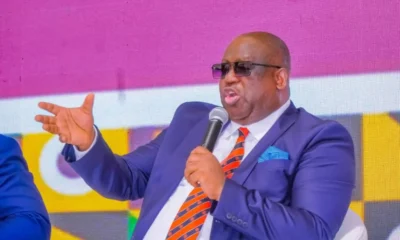

Insecurity in Plateau beyond farmer-herder clashes – Mutfwang
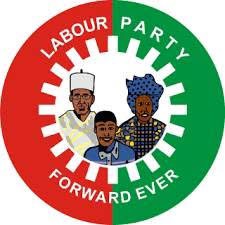

Anambra 2025: Labour Party suspends guber primary indefinitely.
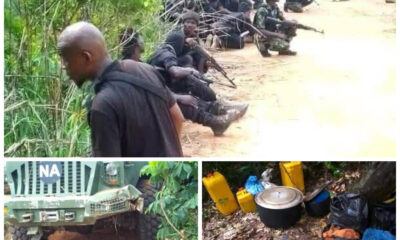

Fear Grips Ogbunka as Security Forces Dismantle Deadly unknown gunmen Criminal Camp After Intense Gun Battle


Digvesh Rathi credits Sunil Narine as inspiration after match-winning spell


Gladys Achese, sister to one of the detained domestic staff of former First Lady Dame Patience Jonathan, has spoken out about the ordeal her family has endured.


Patience Jonathan Holds Secret Meeting With Bayelsa Prison Chiefs Amid Unlawful Detention Of 15 Domestic Workers Over Missing Jewellery
Columns
Afghan’s claim he is 140 years old is investigated by the Taliban
Published
23 hours agoon
April 4, 2025By
Ekwutos Blog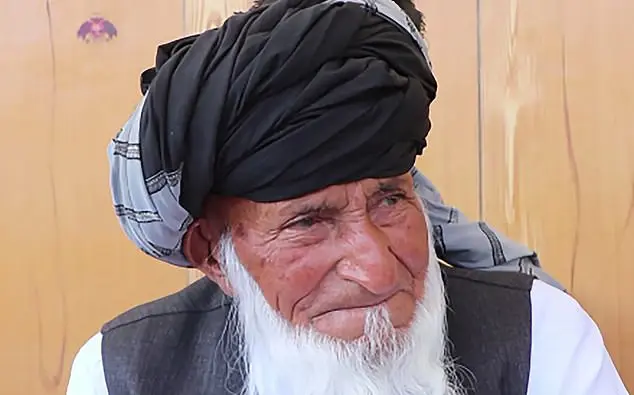
The Taliban is investigating an Afghan man’s claim that he is 140 years old – which would make him the oldest person ever to have lived.
Aqel Nazir, who lives in the country’s eastern Khost province, says he was born in the 1880s.
He claims to remember celebrating the end of the Third Anglo-Afghan War in 1919 alongside King Amanullah Khan, the Afghan leader who launched a campaign against the British, while in his thirties.
Nazir, who lives in the picturesque hills in Khost, said: ‘I was in the palace with King Amanullah Khan.
‘I was over 30 at the time and I remember saying that the British had fled and knelt down.
‘Everyone was happy and thanked King Amanullah Khan for chasing the British away.
‘Many leaders accompanied us to the Arg [presidential palace], but now all of them have passed away.’
The great-great grandfather does not have any documents to support his claim, but his family are also on board with gaining official recognition of his status.
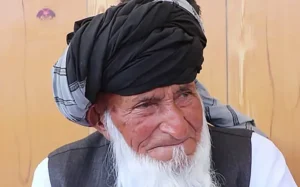
Aqel Nazir, who lives in the country’s eastern Khost province, says he was born in the 1880s
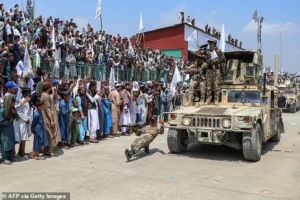
The ruling Taliban administration has dispatched a a special civil registration team to assess his true age
Khyal Wazir, his 50-year-old grandson, said: ‘He is my grandfather, and I have my grandchildren as well.’
Another grandson, Abdul Hakim Sabari, said: ‘We request the government confirm our grandfather’s age using an ID or any other scientific method or documents, to prove he is 140 years old.’
In an attempt to solve the mystery, the ruling Taliban administration has dispatched a a special civil registration team to assess his true age.
Mustaghfar Gurbaz, a Taliban spokesman for the province, said: ‘If confirmed by documents or assessments, we will work to register him as the oldest person in the world.’
If verified, he would comfortably take the title of the oldest person to have ever lived.
That record is held by Jeanne Calment, who was born in 1875 and passed away in 1997, 122 years later.
The world’s current verified oldest living person is Inah Canabarro Lucas, a Brazilian nun who turned 116 last June.
Another Brazilian woman, Deolira Gliceria Pedro da Silva, is hoping to have her own claim to be 120 years of age verified by Guinness World Records.
But experts have already cast doubt on Nazir’s claims.

The world’s current verified oldest living person is Inah Canabarro Lucas

The Brazilian nun turned 116 last June
Valery Novoselov, a geriatrician at Moscow State University, told Russian outlet AIF: ‘There are no reliably registered men on the planet older than 114 to 115 years [of age].
‘In the Caucasus in the 60s, they also recorded “long-livers” – shepherds who allegedly lived to 168 years.
‘These are so-called games with age. There are no documents, no reliable data – which means this is an unrealistic picture.’
In 2015, a man claiming to be 100 years old applied for asylum in Germany after an extraordinary eight-month journey from Afghanistan.
Like Nazir, Abdul Qadir Azizi did not have any identity papers, but his family claimed his year of birth was 1905.
Azizi, who is deaf and blind, spent one month travelling across two continents from his home in the Afghan town of Baghlan to reach Germany.
His family fled after three of Azizi’s sons were killed by the Taliban.
The plight of the elderly in Afghanistan has worsened since the Taliban takeover.
In 2024, they effectively abolished the pension system, leaving many older Afghans struggling to meet basic needs.
Previously, anyone over the age of 65 received a monthly payment of around $100 from the state.
Columns
Tourists lament cancellation of 2025 Eid-el-Fitr Durbar in Kano
Published
1 day agoon
April 4, 2025By
Ekwutos Blog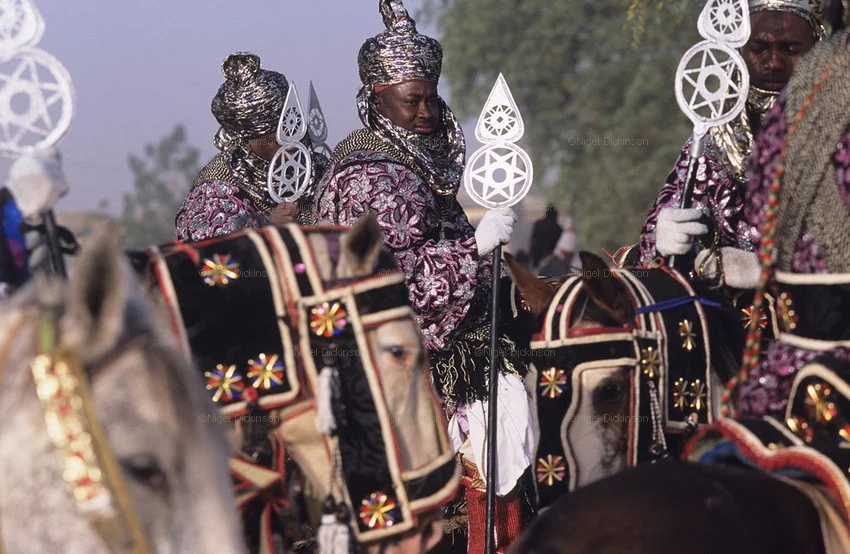
Several tourists have expressed disappointment over the abrupt cancellation of the 2025 Eid-el-Fitr Durbar, a popular traditional horse-riding festival, in Kano State.
More than 160 tourists had traveled to Kano to witness the annual Sallah Durbar, which is renowned for its grandeur and cultural significance. The cancellation, announced shortly before the event, left many visitors disheartened.
Speaking at a press briefing in Kano, Mr. Virgil Taylor, a tourist from the United States who spent a year planning his trip, described the experience as disheartening. He arrived in Nigeria on March 28, 2025, only to learn of the Durbar’s cancellation.
“Kano Durbar, as I understood from my research, was the biggest Durbar to visit. I only learned that the Durbar was canceled when I arrived in Kano. I was terribly disappointed because I had made significant financial commitments to the trip, arranging everything in advance,” Taylor said.
The first-time visitor to Nigeria noted that the Durbar represented a unique and historic opportunity for him, one he had long anticipated. Despite the setback, he appreciated the efforts of the Executive Secretary of the Kano State History and Culture Bureau, Mr. Ahmad Yusuf, and Governor Abba Kabir Yusuf, for providing alternative experiences for tourists.
Taylor, however, urged the Federal Government to minimize the issuance of security threats that could deter investors and tourists from visiting Nigeria. “Despite the financial cost, I consider my visit a blessing and would consider returning, hoping not to be disappointed again,” he added.
Similarly, Lekan Yusha’u, a UK-based Nigerian and polo agent, expressed frustration over the cancellation. He noted that his visit, along with the invitation extended to his friends, was largely inspired by UNESCO’s recognition of the Durbar as part of its heritage program.
“They have never ridden a horse in such a long procession. My goal, along with a couple of friends, was to ensure that within the next year, we put the Kano Durbar procession in the Guinness World Records. Kano Durbar has the largest gathering of horses in the world, with over 4,000 horses participating in a single procession,” Yusha’u said.
He revealed that he had spent over £6,000 on his flight alone, excluding other expenses, and had met over 160 foreign tourists who had come for the same event.
Yusha’u urged the Kano State Government to capitalize on the event’s global appeal, emphasizing that the Kano Durbar is unique to northern Nigeria.
“Both the state and federal government should not disappoint us again by canceling the Kano Durbar,” he said.
The annual Durbar festival in Kano is a cultural showcase that attracts visitors from around the world, featuring colorful horse parades, traditional dances, and displays of local heritage.
Columns
I got married to man who wasn’t financially sound – Michelle Obama admits
Published
2 days agoon
April 3, 2025By
Ekwutos Blog
Former U.S. First Lady Michelle Obama has admitted that Barack Obama was “not financially sound” when she met him.
The couple met in 1988 when Barack took a job at a law firm in Chicago where Michelle was already working.
Speaking on the podcast she hosts with her brother, Craig, Michelle spent much of their most recent episode discussing the importance of having a partner with financial stability.
Talking with British author Jay Shetty, Craig put the question directly to his famous sister.
He asked, “Would you be attracted to a guy who’s not financially sound when you meet him?”
Michelle immediately responded, “Uh, I married one.”
Craig then laughed and admitted to his sister that he’d set her up.
“Don’t you like that alley-oop I just threw you? In basketball, you just point—you don’t even have to say it,” he said.

Insecurity in Plateau beyond farmer-herder clashes – Mutfwang

Anambra 2025: Labour Party suspends guber primary indefinitely.

Fear Grips Ogbunka as Security Forces Dismantle Deadly unknown gunmen Criminal Camp After Intense Gun Battle
Trending

 Trending6 months ago
Trending6 months agoNYA demands release of ‘abducted’ Imo chairman, preaches good governance
- Business6 months ago
US court acquits Air Peace boss, slams Mayfield $4000 fine

 Politics5 months ago
Politics5 months agoMexico’s new president causes concern just weeks before the US elections
- Entertainment6 months ago
Bobrisky transferred from Immigration to FCID, spends night behind bars
- Entertainment5 months ago
Bobrisky falls ill in police custody, rushed to hospital

 Politics5 months ago
Politics5 months agoRussia bans imports of agro-products from Kazakhstan after refusal to join BRICS

 Politics5 months ago
Politics5 months agoPutin invites 20 world leaders
- Politics1 year ago
Nigerian Senate passes Bill seeking the establishment of the South East Development Commission.

